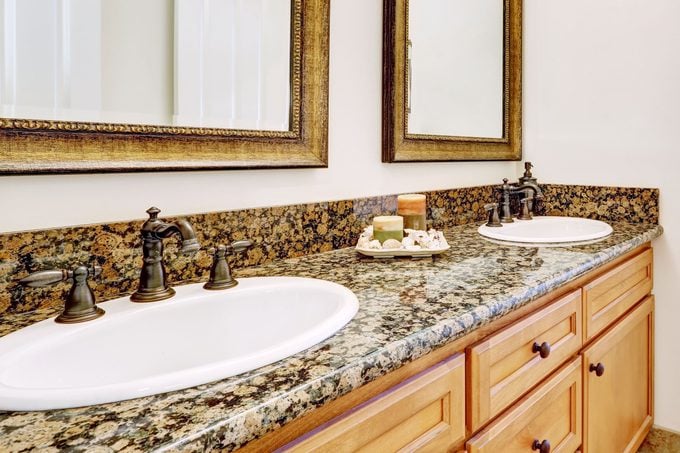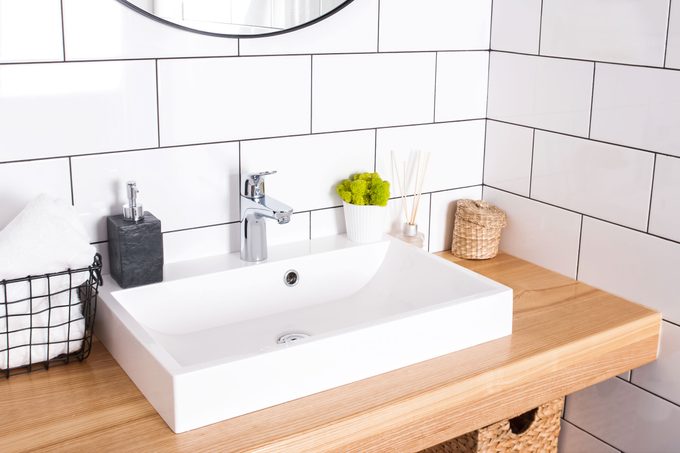From rich quartz to sturdy wood and meticulously installed tile, a quality countertop sets the tone for the bathroom. As a large surface that’s eye-catching and functional, the countertop creates an aesthetic that ties together everything from the faucet to the light fixtures.
How To Choose a Bathroom Countertop
Whether you’re remodeling or building new, here are the factors to consider as you select a bathroom countertop.
Durability
Bathroom countertops are a work surface, especially in a master suite. They need to stand up to everything from dripping toothpaste to dropped hairdryers. And they should be easy to clean!
It’s important to maintain sanitary conditions, so choose a countertop that’s not only rugged enough for everyday use but compatible with your favorite cleaning products.
Cost
Be sure to account for the material and the potential installation charges. Even if you’ll be installing the countertop yourself, don’t forget to factor in transportation time and costs.
Lastly, remember there’s a wide range of pricing for many of the countertop materials listed below. Take tile countertops, which might vary from $1 to $15 per square foot.
Availability
Talk to your supplier to verify the countertop will be ready to go when it’s time to install. Even a short delay in delivery can cause a major scheduling headache, possibly requiring you to install a temporary countertop.
Installation (Is it DIYable?)
Due to countertop weight, many homeowners choose professional installation even if the plumbing hookups and caulking will be DIY.
If you do opt to do it yourself, remember that only the smallest of countertops can be easily installed by one person. Even lighter materials such as wood can be bulky to manipulate on your own, and heavier materials such as marble often require two to three people.
Another consideration: Cutting the holes for the sink and faucet. For marble or quartz, you’ll likely want the manufacturer to cut these for you. This will require precise layouts and communication to avoid miscuts. Wood or laminate countertops are usually much more DIY friendly.
Sustainability
For the most Earth-friendly countertops, ask your supplier how and where the material is harvested. Locally sourced materials almost always have a lower environmental impact. Picking a sustainable option may not affect the installation, but it’s one of those intangibles that will give you a sense of pride every time you look at the countertop.
Bathroom Countertop Materials
There are lots of materials to choose from. The best choice for your specific project depends on the above factors, along with your budget and personal style.
Granite bathroom countertops

A naturally occurring stone, granite countertops tend to have beautiful patterns, including dramatic veins of colors.
Pros:
- Beautiful appearance;
- Heat resistant;
- Scratch resistant;
- Chemical resistant (although chemical spills may damage sealer);
- More affordable than marble;
- Natural and may be locally sourced.
Cons:
- Porous material that can be stained unless properly sealed (generally, the lighter the granite the more porous);
- Sealer can be damaged if cleaned with acidic products;
- Not DIY friendly;
- More costly than most other countertop options.
Quartz bathroom countertops
Although named after a mineral, quartz countertops are actually a manufactured material. Formed of quartz powder and resin, quartz countertops can be cast into a range of shapes and any color imaginable.
Pros:
- Non-porous, so stain resistant and don’t require sealing;
- Heat resistant;
- Scratch resistant.
Cons:
- Costly;
- Not DIY friendly;
- Can’t be cleaned with bleach or abrasives (they’ll cloud the surface).
Marble bathroom countertops
Marble is a natural stone, mined from quarries and cut into slabs. It comes in various colors, and can have beautiful flecks and mineral veins. Like granite, it needs to be sealed and maintained.
Pros:
- Beautiful appearance;
- Heat resistant;
- Scratch and chip resistant;
- Natural and may be locally sourced.
Cons:
- Costly;
- Not DIY friendly;
- Naturally porous material and vulnerable to staining unless sealed.
- Slightly less resistant to impact than granite, although this is a bigger concern in the kitchen.
Cultured marble bathroom countertops
Much like quartz countertops, cultured marble is made with marble dust and resins. The result is a dense, durable surface that can be formed in almost any shape.
Pros:
- Affordable;
- Manufactured product, so it can come with integrated sink basins and backsplashes;
- Impact resistant;
- Sealed at factory;
- DIY friendly.
Cons:
- Though it comes with a surface seal, it can still be stained by dyes;
- Vulnerable to solvents such as nail polish remover.
Wood bathroom countertops

Wood countertops can be custom-made to fit any space, and fashioned from various woods to match almost any décor.
Pros:
- Can be any size or shape;
- DIY friendly;
- Can look modern or rustic;
- Flexible pricing, depending on design and type of wood;
- Natural and may be made from sustainable woods.
Cons:
- Vulnerable to water;
- Needs to be sealed or painted, and maintained regularly;
- Can expand/contract in humidity, especially near steamy showers.
Laminate bathroom countertops
Laminate countertops feature a smooth top surface bonded to a particleboard base. They peaked in popularity in the mid-20th century. Laminate technology has improved since those days, and current versions are more resistant to damage than laminates from decades past.
Pros:
- Extremely affordable;
- Extremely DIY friendly to install;.
- Available in modern and retro styles.
Cons:
- May not look “high end;”
- Prone to chipping and scratching;
- Laminate is water-resistant but underlayer vulnerable to water.
Concrete bathroom countertops
Concrete countertops can be prefinished and installed whole or poured in place. Either way, they offer an industrial, modern appearance with endless options for customization.
Pros:
- Great for intermediate to advanced DIYers;
- Extremely resistant to chips and scratching;
- Modern look;
- Wide range of color and style options;
- Can be poured to form a single, seamless slab.
Cons:
- Heavy;
- Porous material that needs to be sealed to resist staining;
- Messy if finished in place.
Tile bathroom countertops
Tile can be placed over a basic countertop to make it blend or contrast with the rest of the bathroom.
Pros:
- Clean look;
- Price flexibility depending on tile selection;
- DIY friendly;
- Scratched or chipped tiles can be individually replaced.
Cons:
- Grout lines can be difficult to clean.
- Tile and grout will need occasional sealing.
Article source here: How To Choose the Right Bathroom Countertop


No comments:
Post a Comment